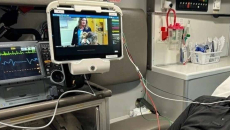Interoperability
Caroline Zago, healthcare informatics leader for Latin America at Philips, says the company leverages AI and machine learning to streamline workflows, make data easier for patients to understand and elevate care quality.
SPONSORED
Teresa Sacchetta, healthcare director at InterSystems Brazil, says the company's tools support health systems with government regulations compliance, including ensuring that patients consent to sharing their data.
The new health record system is targeted for go-live by mid-year.
Consolidating vaccine records from multiple providers and recommending additional needed doses has big benefits for patients, says Rebecca Coyle, executive director of the American Immunization Registry Association.
JeanCarlo Luz, electronic medical records leader at Philips, discusses how the company's EMR leverages cloud services and interoperability with multiple partners to help to deliver time and cost savings for hospitals.
SPONSORED
Following these guidelines can help avoid or reduce obstacles on the journey to implementing generative AI solutions.
Surescripts becomes a QHIN while Redox joins CommonWell. Also, the Sequoia Project releases a payer-to-payer FHIR API Compliance Readiness Checklist 20 months ahead of a key CMS data exchange compliance deadline.
Starting Jan. 1, 2026, payers must send prior authorization decisions within 7 days and expedited decisions within 72 hours.
How can nursing leadership best shape the future of healthcare? With a shrinking workforce and growing incidents of workplace violence, what can we do right now to solve the challenges of today before they become the crises of tomorrow? What are the opportunities with emerging technology and AI to manage clinical outcomes and operational excellence?
SPONSORED
Telemedicine delivers health equity and improved patient outcomes.











